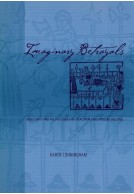Compassion's Edge: Fellow-Feeling and Its Limits in Early Modern France (Hardback)
Imprint: University of Pennsylvania Press
Series: Haney Foundation
Pages: 352
ISBN: 9780812249705
Published: 27th November 2017
Script Academic & Professional
Series: Haney Foundation
Pages: 352
ISBN: 9780812249705
Published: 27th November 2017
Script Academic & Professional
You'll be £8.95 closer to your next £10.00 credit when you purchase Compassion's Edge: Fellow-Feeling and Its Limits in Early Modern France. What's this?
+£4.99 UK Delivery or free UK delivery if order is over £40
(click here for international delivery rates)
Order within the next 1 hour, 28 minutes to get your order processed the next working day!
Need a currency converter? Check XE.com for live rates
(click here for international delivery rates)
Order within the next 1 hour, 28 minutes to get your order processed the next working day!
Need a currency converter? Check XE.com for live rates
Compassion's Edge examines the language of fellow-feeling—pity, compassion, and charitable care—that flourished in France in the period from the Edict of Nantes in 1598, which established some degree of religious toleration, to the official breakdown of that toleration with the Revocation of the Edict in 1685. This is not, however, a story about compassion overcoming difference but one of compassion reinforcing division: the seventeenth-century texts of fellow-feeling led not to communal concerns but to paralysis, misreading, and isolation. Early modern fellow-feeling drew distinctions, policed its borders, and far from reaching out to others, kept the other at arm's length. It became a central feature in the debates about the place of religious minorities after the Wars of Religion, and according to Katherine Ibbett, continues to shape the way we think about difference today.Compassion's Edge ranges widely over genres, contexts, and geographies. Ibbett reads epic poetry, novels, moral treatises, dramatic theory, and theological disputes. She takes up major figures such as D'Aubigné, Montaigne, Lafayette, Corneille, and Racine, as well as less familiar Jesuit theologians, Huguenot ministers, and nuns from a Montreal hospital. Although firmly rooted in early modern studies, she reflects on the ways in which the language of compassion figures in contemporary conversations about national and religious communities. Investigating the affective undertow of religious toleration, Compassion's Edge provides a robust corrective to today's hope that fellow-feeling draws us inexorably and usefully together.
Other titles in the series...
Other titles in University of Pennsylvania Press...
















